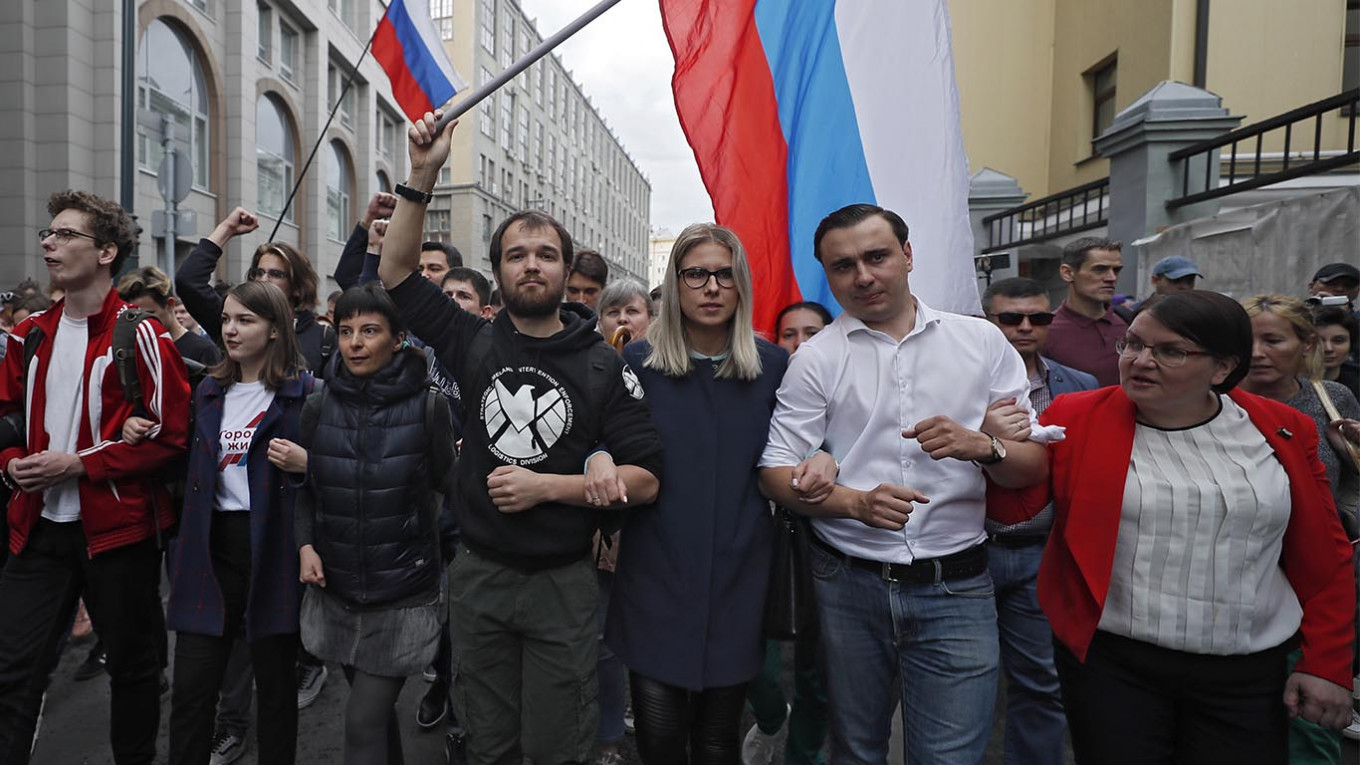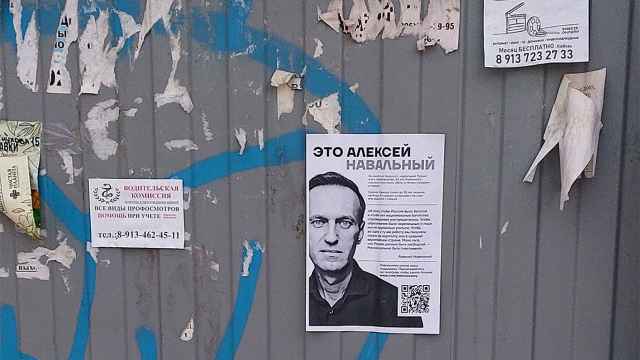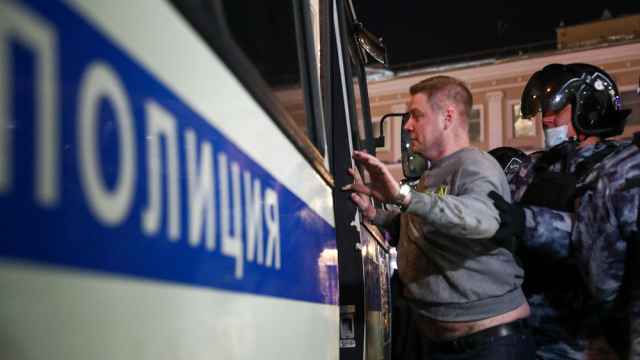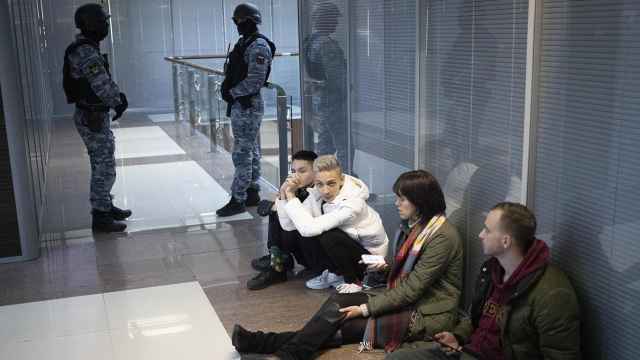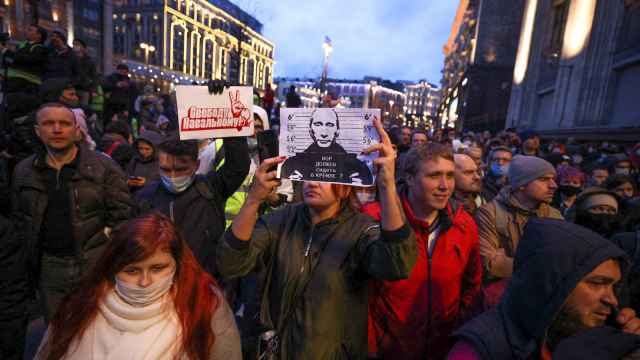While Russia’s most prominent opposition politician Alexei Navalny lies in a coma in a Berlin hospital after suffering an apparent poisoning last week, the pressure on his activities continues back home.
On Wednesday, Yevgeny Prigozhin, a catering magnate nicknamed “Putin’s chef,” bought the 88 million rubles ($1.2 million) in debt Navalny, his ally Lyubov Sobol and the Anti-Corruption Foundation the Kremlin critic founded were court-ordered to jointly pay to a catering company linked to Prigozhin over a video investigation into tainted school lunches. That means the payment now has to go directly to Prigozhin.
“I intend to strip this group of unscrupulous people of their clothes and shoes,” Prigozhin said in a press statement.
Then, later Wednesday, a Moscow court inflated the sum Navalny owes by more than 3.3 million rubles ($43,709) in a separate defamation lawsuit over another video report into a different company.
“I don’t remember a year when the authorities did not pressure the Anti-Corruption Foundation,” Sobol, a lawyer with the group since its founding in 2011, told The Moscow Times in an interview Wednesday.
She brushed off the developments as just another day at the office.
“Putin feels his impunity, so he believes that he can continue doing this,” she added, pointing to the Russian president as the key figure behind all of the actions taken against Navalny. “He is clearly scared of the Anti-Corruption Foundation and Alexei Navalny as his main opponent.”
Over the years, Navalny and his group have published video investigations into figures ranging from former Prime Minister Dmitry Medvedev to oligarchs like Oleg Deripaska exposing what they see as the corruption they believe is the primary feature of Vladimir Putin’s government. Navalny and his allies have also run for office and periodically rally people to street protests.
In addition to that work, the political movement since last year has made its primary goal an election strategy Navalny dubbed Smart Voting. The plan advises voters to cast their ballots for the candidates who have the best chance of unseating representatives of the ruling United Russia party in elections at all levels across the country.
All of this has put a target on Navalny’s back. In 2017, pro-Kremlin activists threw a chemical in his face that left him partially blind in one eye. During one of the opposition politician’s many stints behind bars over the years in 2019, he had an acute allergic reaction his personal doctor said was the result of a poisoning.
The pressure has also landed on the Anti-Corruption Foundation, which faces regular raids on its offices and saw one of its key investigators kidnapped and reportedly forced into military service in the Arctic last year. Navalny’s immediate family has also been affected. His brother spent 3.5 years in prison on embezzlement charges Navalny’s supporters believe were politically motivated.
But the pressure was ratcheted up to a new degree last Thursday when Navalny suffered an apparent poisoning so serious in Siberia that he was eventually evacuated to Berlin. His German doctors have said they found evidence indicating Navalny was poisoned and are worried about possible long-term damage to his nervous system.
This week the Kremlin said it believes the German doctors rushed to a conclusion and that it does not see a need to investigate the apparent poisoning. On Thursday, however, police in Siberia launched a preliminary inquiry.
“Taking part in politics outside of the artificial system managed by the Kremlin is becoming a health hazard, leaving Putin’s opponents few options other than emigration,” wrote Tatiana Stanovaya, founder of the R.Politik political analysis project.
Yet in interviews this week, Navalny’s allies said they were more determined than ever to continue their work.
“Of course it’s a new level of pressure and of course we have to come up with something,” said Ivan Zhdanov, director of the Anti-Corruption Foundation. “But does it mean we will stop our investigations? Of course not. Smart Voting will also go on. These projects can go on temporarily without Alexei.”
Up next on the team’s radar are regional elections on Sept. 13, when it will be deploying its Smart Voting strategy. The elections are the reason Navalny was in Siberia in the first place, touring the region to promote the candidates his group has chosen to support.
“Navalny’s role was for the most part raising awareness as he is the main media resource,” Zhdanov said, referring to the millions of subscribers who follow Navalny on his social media channels. “Without him it’ll be harder, but we’ll keep working how we can.”
For her part, Sobol believes Navalny’s most visible associates, who she named as herself, Zhdanov and Leonid Volkov, who coordinates the group’s regional offices, are set up to continue the political movement no matter Navalny’s health status.
“He has spent more than a year in prison in total over recent years and the Anti-Corruption Foundation always continues its work,” she said. “We have a lot of people who are experienced and have an understanding of how to continue the battle for the democratization of Russia.”
But while politicians like Sobol and Zhdanov have previously rallied people to the streets, as they did last summer in protests over fair elections in Moscow, they are lightweights compared to Navalny, said Konstantin Kalachev, head of the Political Expert Group think tank.
“Navalny is a middleweight on his way to becoming a heavyweight politician,” Kalachev said, continuing the boxing analogy. “Every other opposition politician in Russia is a lightweight.”
Sobol, however, said she believes the ongoing protest movements in Russia’s Far East over the arrest of the Khabarovsk region’s overwhelmingly popular governor, and in neighboring Belarus over President Alexander Lukashenko’s re-election that was widely seen as rigged, indicate that calls for change can happen without opposition leaders.
“The people are coming out for themselves, not because a leader told them to,” Sobol said. “I think further protest in Russia will happen this way too, not because someone said let’s go, but because people are forced to do so by an understanding that they can no longer keep living with how things are.”
As for the risks that Navalny’s allies could incur in his place, Sobol pointed to her own similar experience. In 2016, her husband was stabbed in the thigh with a psychotropic substance, causing him to convulse and lose consciousness.
The investigative Novaya Gazeta newspaper later reported that the hit was ordered by Prigozhin, who has been linked, in claims he denies, to alleged U.S. presidential election meddling and proxy wars in Ukraine and Syria. Sobol pointed to him and the Federal Security Service (FSB) as the two institutions who could have poisoned Navalny. She said both of them would have had to get approval from Putin to do so.
“All I’m thinking about right now is wanting to work more effectively,” Sobol continued. “I want to make sure that all these casualties were not in vain.”
A Message from The Moscow Times:
Dear readers,
We are facing unprecedented challenges. Russia's Prosecutor General's Office has designated The Moscow Times as an "undesirable" organization, criminalizing our work and putting our staff at risk of prosecution. This follows our earlier unjust labeling as a "foreign agent."
These actions are direct attempts to silence independent journalism in Russia. The authorities claim our work "discredits the decisions of the Russian leadership." We see things differently: we strive to provide accurate, unbiased reporting on Russia.
We, the journalists of The Moscow Times, refuse to be silenced. But to continue our work, we need your help.
Your support, no matter how small, makes a world of difference. If you can, please support us monthly starting from just $2. It's quick to set up, and every contribution makes a significant impact.
By supporting The Moscow Times, you're defending open, independent journalism in the face of repression. Thank you for standing with us.
Remind me later.



